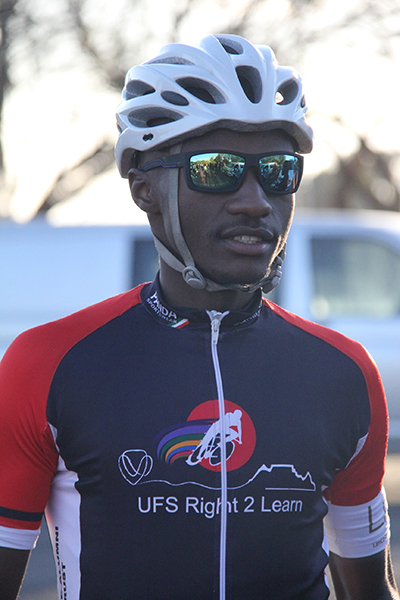
Asive Dlanjwa, Bloemfontein Campus SRC President, on the
morning of their departure from Bloemfontein.
Photo: Nhlanhla Modzanane
It is a new day and the Right to Learn cycling team continues to make its way to Cape Town.The team arrived at their first stop in Luckhoff on day one, after cycling for 182 kilometres in five hours and five minutes. They left Luckhoff at 05:00 in the morning on day two, heading towards Britstown via De Aar and arrived at midday. On day three, the team will rest in Britstown and will continue cycling on day four, 30 November 2017, to Victoria West for 133 kilometres via Merriman.
Looking forward to another day
Asive Dlanjwa, Bloemfontein Campus SRC President, felt confident about day two despite the strong winds that they experienced along the way. “I’m feeling strong, I actually thought after day one that I’ll be feeling a bit weak, but I just don’t know how we are going to make it in this wind,” he says. Dlanjwa and his fellow cyclists cycled for 213 kilometres to Britstown, where they ended their race for day two.
Kovsies fully behind cycling team
The tour began on 27 November 2017 in Bloemfontein, when they were sent off by Prof Nicky Morgan, former Vice-Rector: Operations, Pura Mgolombane, Dean of Student Affairs, and their Kovsie peers. Prof Morgan encouraged the team to have a wonderful and enjoyable journey, acknowledging that the journey will not be an easy one. “I want you to know that you have the support of everyone here at the UFS,” he said.
Messages of support continue to pour in for the team on the UFS social media platforms. The Qwaqwa Campus SRC President, Hlalele Masopha, also sent his best wishes to his mate, saying, “I wish the President with his crew a quantity of good fortune and extremely good success.” He says, “This is for the betterment of the students and the institution.”
There have been no reports of any injuries or medical defects incurred by the cyclists nor the supporting team who are travelling with them. The team is expected to arrive in Cape Town on 4 December 2017.
You can make a donation as follows:
Give-n-gain page
EFT transaction:
Please use the following bank details:
Bank: ABSA Bank
Account Number: 1570850721
Branch Code: 632005
Account Type: Cheque
Reference: R2L: Right to Learn
Send the proof of payment Rinda Duraan: duraanmj@ufs.ac.za
Debit order: Download the form and email it to Rinda Duraan
All donations are tax deductible in terms of South African income tax legislation.
Related article:
27 November: Kovsies SRC President cycles to raise money for registration